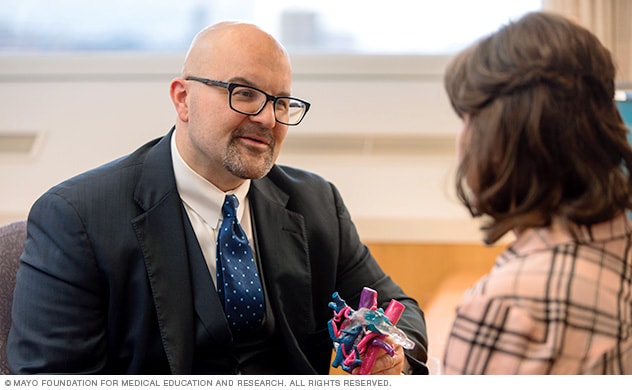Mayo Clinic's approach

Mayo Clinic gastroenterologists, cancer specialists and surgeons collaborate in the care of people with pancreatic cancer.
- Multidisciplinary team. Mayo Clinic doctors from several specialties collaborate to provide coordinated, comprehensive care. Specialized cancer surgeons (surgical oncologists), gastroenterologists, medical oncologists, radiation oncologists, radiologists, pathologists and other experts provide comprehensive, individualized care for people considering or being recommended to undergo the Whipple procedure.
- Individualized approach. At Mayo Clinic, your care team develops a treatment plan suited to your exact situation. In each case, the goals are to improve recovery, quality of life and cancer outcomes. Your care is coordinated by one physician, often a surgical oncologist, which ensures continuity from diagnosis through surgery. The surgical, anesthesia and nursing teams at Mayo Clinic are dedicated to making your surgery and hospital stay as pleasant and comfortable as possible.
-
Surgical expertise. Mayo Clinic surgeons are experts in the Whipple procedure, every variation of it, as well as other pancreatic operations. Each surgeon has specialized and extensive training and experience with Whipple procedures and other pancreatic operations. Studies show that choosing an experienced surgeon reduces your risk of complications.
Surgeons at Mayo Clinic can often perform these pancreatic operations using either laparoscopic or robotic techniques that have been shown to allow for a faster recovery in select patients.
- Innovative treatments. Mayo Clinic experts pioneered a treatment approach for people with borderline, locally advanced pancreatic cancer, also called advanced stage 3 cancer. This treatment has been shown to help people who were previously told that surgery wasn't an option. People eligible for this protocol receive chemotherapy with new highly effective drugs, followed by radiation and complex surgeries previously not thought possible. This tailored approach has increased the number of people who may safely benefit from surgery.
Mayo Clinic surgeon Mark J. Truty, M.D., M.S., discusses pancreatic cancer care at Mayo Clinic.
Those patients who had these operations, who did not have any therapy up front but went straight to the operating room, they didn't do well long-term. But we did find out that those patients that had some form of therapy prior to their operation has significantly improved outcomes long-term.
We've also found there are short-term outcomes in terms of our complication rates, etc. has decreased over time. And thus, all in all, it's showing that these patients who are typically not the offered an operation can have both good short-term and long-term results.
We're definitely seeing a big revolution. A lot of this has to do with better chemotherapy drugs, which are much more effective, utilization of what we call multi-modal therapy, chemotherapy, radiation, and then an aggressive operation. And now we can potentially offer these therapies to patients who had previously had no other options.
The key thing is the sense of optimism that there are options. Not everyone wants to sign up for these big operations or there's long protocols of chemotherapy and radiation. But just having the options available to them to make that educated decision about whether this is something that would benefit them. Otherwise, they had no options there told has nothing to do, go home and make arrangements, we're offering them some additional bit of hope for a pretty large, substantial number of patients that had been previously ignored.
We found that the median survival, meaning the average number, the average duration of life after they'd go through this protocol is now approaching four years, which is about four times that would normally be done in patients who would not have undergone an operation. We additionally found that those patients that get more chemotherapy prior to their operation do significantly better. Those patients who had a tumor marker, which is a blood test that they measure, if it's elevated prior at the diagnosis and if it comes back to normal, those patients also do significantly better.
And then obviously once we take the cancer out and our pathologist looks at it under microscope, if just minimal residual cancer again, those patients do significantly better. So we're hoping that this will now spread to the rest of the country. Now people have a roadmap of how to treat these patients where it's been difficult anatomical circumstances that hopefully it'll be all chemotherapy upfront, maximize the duration of chemotherapy, followed by radiation therapy to help with an eventual operation. And then to take these people to the operating room with all the other metrics are aligning.
The Mayo Clinic experience and patient stories
Our patients tell us that the quality of their interactions, our attention to detail and the efficiency of their visits mean health care like they've never experienced. See the stories of satisfied Mayo Clinic patients.
Expertise and rankings

A Mayo Clinic surgical oncologist explains the Whipple procedure using a model based on CT scans and created with a 3D printer.
Comprehensive cancer center
Mayo Clinic Comprehensive Cancer Center meets strict standards for a National Cancer Institute comprehensive cancer center. These standards recognize scientific excellence and a multidisciplinary approach to cancer prevention, diagnosis and treatment.
Innovation and research
Mayo Clinic researchers conduct studies and clinical trials to improve the Whipple procedure and other approaches to pancreatic cancer. Mayo Clinic is a leader in the minimally invasive (laparoscopic) approach to the Whipple procedure and is one of the few medical centers offering it.
The frequent collaboration among Mayo Clinic researchers, oncologists, surgeons, pathologists and others generates a full spectrum of research projects. For example, researchers study the benefits of combining PET and MRI radiologic imaging techniques to help surgeons determine which patients are responding to chemotherapy and therefore might significantly benefit from surgery.
Using large national data sets, investigators are learning about how best to sequence therapy for people with cancer to get the best long-term survival. They also are working on decreasing complications in older adults undergoing Whipple procedures and determining how to treat rare pancreatic tumors.
At Mayo Clinic, you may have access to clinical trials, research and new approaches to treatment.
Nationally recognized expertise
The Whipple procedure is a complex operation that requires highly skilled and extensively trained surgeons with specific expertise and understanding of the cancers and diseases that affect the pancreas. Mayo Clinic surgeons are specially trained to provide you with the best care, and they perform more than 500 Whipple procedures and related surgeries each year. Mayo Clinic's operating mortality rates are among the lowest in the country.
Mayo Clinic has been recognized as a top cancer hospital by U.S. News & World Report since it began publishing rankings in 1990. Most recently, Mayo Clinic in Rochester, Minnesota, Mayo Clinic in Jacksonville, Florida, and Mayo Clinic in Phoenix/Scottsdale, Arizona, have been recognized among the top Cancer hospitals in the nation for 2023-2024 by U.S. News & World Report.
Locations, travel and lodging
Mayo Clinic has major campuses in Phoenix and Scottsdale, Arizona; Jacksonville, Florida; and Rochester, Minnesota. The Mayo Clinic Health System has dozens of locations in several states.
For more information on visiting Mayo Clinic, choose your location below:
Costs and insurance
Mayo Clinic works with hundreds of insurance companies and is an in-network provider for millions of people.
In most cases, Mayo Clinic doesn't require a physician referral. Some insurers require referrals or may have additional requirements for certain medical care. All appointments are prioritized on the basis of medical need.
Learn more about appointments at Mayo Clinic.
Please contact your insurance company to verify medical coverage and to obtain any needed authorization prior to your visit. Often, your insurer's customer service number is printed on the back of your insurance card.
Clinical trials
Explore Mayo Clinic studies of tests and procedures to help prevent, detect, treat or manage conditions.
Aug. 09, 2023